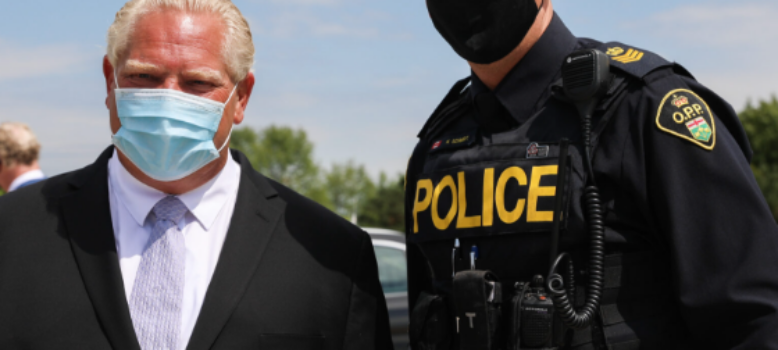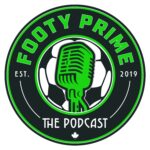
Ontario’s Court of Appeals just gave Doug Ford and the OPP a Free Pass to do whatever they want. Again.

Ethics specialist Doug Ford recently freed from the tedium of cross-referencing family wedding invitations against CPC donor lists, has been gifted a win in the Ontario Court of Appeal that will undoubtedly please the OPP and Ford’s Solicitor-General Sylvia Jones, as well as the rogue lawmaker himself.
But the decision released Wednesday was a setback for a class action group that wants to sue both the provincial cops and the Minister for alleged “misfeasance in public office, nonfeasance, negligence, and nuisance” arising from damages claimed by residents and businesses of Caledonia, ON adversely impacted by the city’s four-month-long road and rail blockade involving FN protesters in 2020.

The class action lawsuit in Poorkid Investments v. HMQ alleges that both the OPP and the Solicitor-General failed to carry out their legal duties as Crown agents responsible for ensuring Ontario law enforcement operates safely, effectively, and accountable manner.
A lower court decision had smoothed the way for the class action to proceed when it annulled a contentious section of Ford’s 2019 law, the Crown Liability and Proceedings Act (CLPA).
A unanimous three-judge Court of Appeal panel Mon arch 15 overturned the Ford loss.
The ruling arrives a mere dozen days after the same Court had annulled one of Ford’s unconstitutional forays into self-dealing when it found a one-year gag law too much, even for an Ontario statute.
The decision to shield the men in blue from explaining themselves for the Caledonia calamity (in the wake of the performance of the OPP during the Ottawa Convoy occupation) came in a decision Wednesday.
Overturning the lower court, the ruling in favor of the Crown raises the specter yet again of judicial fiction emanating from the bench, wherein a judge approaches a case with a predetermined verdict (i.e., the police and Ford must prevail) and fashions a decision working backward marshaling only select facts to justify an OPP-favourable verdict.
The premise may hold water because the defendants in the main activities include the OPP and its minister: Dare an Ontario judge to permit the Inspector of the OPP to be deposed by a citizen’s lawyer in a pre-trial discovery as part of a certified class action?
It is fair to speculate that the police remain bulletproof in the eyes of almost every institution in the province, including the judiciary.
It would appear public authorities have about as much commitment to policing the police as Doug Ford has to public healthcare and education. And these institutionalists are increasingly caving to fascists.
Green-lighting an action against police forces for misfeasance in public office, nonfeasance, negligence, and nuisance was perhaps a bridge too far for Ontario’s judiciary, even for a Court that declared less than two weeks ago that Ford’s imposition of a 365-day pre-election gag on third-party activists infringed voting rights.
******
The lower court in the Caledonia class action knocked out s. 17 of the CLPA, a contentious screening procedure that applies to claims against the Crown for misfeasance in public office or a tort based on lousy faith respecting anything done in the exercise or intended exercise of powers, duties, or functions.
The self-dealing former hashish dealer sought to put shackles on any party seeking to sue the Crown. But the Ontario Superior Court ruled a critical section of the CLPA to have no force or effect in February 2022.
A lower court struck down Ford’s self-appointment as a gatekeeper in the Ontario justice system because he sought to make his government less accountable.
But this week’s decision by the top court means the government has survived a legal challenge to one of its raft of belligerent, overreaching statutes, one that stifles lawsuits against the government itself.

“We are considering the options open to us,” said class action legal counsel W. Peter Murray of Caledonia in an email response to Crier Media, seeking leave to appeal to the Supreme Court of Canada.
Ford’s CLPA stipulates proceedings brought against the Crown or an officer or employee of the Crown must establish that the proceeding is brought in good faith and that there is a reasonable possibility the claim will succeed.
Named as defendants in the class action are the Solicitor General of Ontario, Jones, the Ontario Provincial Police Commissioner, the OPP Chief Superintendent, and an inspector of the OPP.
Under the CLPA, a claimant requesting leave from the Court to sue Ford’s government must also provide evidentiary support by affidavit. The claimant may also be compelled to submit to cross-examination.
By contrast, the Crown has no corresponding obligation to give any documentary or oral discovery in response.
******
Activists stopped construction work on the contested land in 2020, saying it was unceded Haudenosaunee Territory, and renamed it 1492 Land Back Lane. The land sits on the Haldimand Tract, 384,451 hectares of land along the Grand River granted to Six Nations in 1784 for allying with the British during the American Revolution.

The British Crown rewarded the Six Nations for its loyalty by allowing them to “take possession of and settle” 385,000 hectares of land. The land formed a strip almost 20 kilometers wide alongside the Grand River.
The land dispute came to wide attention in Canada in 2006 when the Six Nations formally reactivated litigation initially brought in 1995 against Canada and Ontario. Protesters from the Six Nations of the Grand River demonstrated on a parcel of land in Caledonia, a community within the municipality of Haldimand County, roughly 20 kilometers (12 miles) southwest of Hamilton. Soon after this demonstration, the demonstrators took control of the disputed land, the planned site of a subdivision known as “Douglas Creek Estates.”
In February and March 2020, the dispute again entered public consciousness with Mohawk protesters blockading Highway 6 as part of the 2020 Canadian pipeline and railway protests in solidarity with the Wetʼsuwetʼen and later with the occupation of the site of another planned subdivision in Caledonia, “McKenzie Meadows.”
The populist Ford was his usual unpolished self during the 2020 protests:
“You know, you just can’t go in and just take over people’s future homes; it’s wrong. And then, when the police come, this is where the people at home are going to– they get an outhouse, toss it over from a bridge onto a police car, then start throwing rocks at the police car! Like, enough is enough. I’m just losing my patience. I can’t direct the police, and I won’t direct the police, but people have to obey the rules. I don’t care where you come from, your race, creed, color, whatever; we have one country, one rule, and that is it! Simple: respect each other. Cause I have a tremendous amount of respect for the Indigenous community, and there’s just a few– couple dozen. Uncalled for. Unacceptable.”
-30-
Robert Lee
Meet Robert. He is a former veteran news reporter/magazine editor incensed at how the North American media props up buffoons like Trump & Ford. Time to put "comfort the afflicted and afflict the comfortable" back into the newsroom's Mission Statement.








